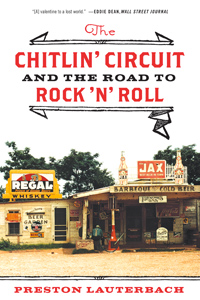Reviews of The Chitlin’ Circuit
The Wall Street Journal Top Ten Non-Fiction books of 2011
The Boston Globe Top Non-Fiction books of 2011
An NPR Best Music Book of 2011
An Onion AV Club Best Book of 2011
“Lauterbach traces the vibrant history of the ‘chitlin’ circuit’ – the dance halls, juke joints and night clubs that catered to black audiences and flourished in the South for two decades beginning in the 1930s.” Ihsan Taylor, The New York Times
“Mr. Lauterbach uncovers a story as sensational as any day-glo circuit-show poster…The era’s hepcat lingo (‘ork’ for orchestra, ‘ofay’ for ‘white’) and hard-boiled, noir ambience give Mr. Lauterbach a tune he can carry….the book is at heart a well-researched valentine to a lost world of seedy con men, promoters and club owners, the power brokers and hustlers who made the ‘circuitry spark.’ ”
“A major achievement and an important contribution to American musical history.” June Sawyers, Booklist, Starred review
“Crucial….spirited, studious, surprising, occasionally hilarious—is absolutely persuasive on its subject.” Stephen M. Deusner,
“Preston Lauterbach’s rollicking, radiant new book plumbs the music’s deep black roots, providing an important historical corrective….Lauterbach spins the tale with enormous vitality and it’s terribly fun to read.” Kate Tuttle, The Boston Globe
“This sprawling, fascinating history drops readers into a chaotic, dangerous, utterly vanished world. It turns out to be more vibrant than the standard rock ‘n’ roll mythology. The true dawn of rock lit a landscape in which timeless music got made thanks to every vice and virtue imaginable. Now that’s America.” John Repp, The Cleveland Plain Dealer
“Highly recommended….relishes the criminal origins of the mostly southern black club scene from the early ’30s to the late ’60s
….a coherent, musically savvy history of a performance culture that until now was known only piecemeal.” Robert Christgau, Salon.com and Barnes and Noble Review
“Lauterbach’s tribute to [the chitlin’ circuit] is welcome and overdue.” Jonathan Yardley, The Washington Post
“Vivid characterizations and killer storytelling chops…. first-class entertainment…. the wild characters who built and lived in the twilight world of mid-century black American nightclubs come alive on the page….The Chitlin’ Circuit and the Road to Rock and Roll is the genius prequel to an oft-told epic. As Lauterbach puts it in the book’s introduction, the story of America’s most influential creation begins “not with an old song, but with a lost world.” With this book, that world again comes to life.” Alison Fenterstock,
“Lauterbach has written the definitive history of the musical back roads and back rooms of the southern United States…. a great read, well written and insightful. Highly recommended to anyone interested in the seedy history of American popular music.” Library Journal, Starred review
“Lauterbach’s writing is as energetic as a Little Richard song (a performer who started on the chitlin’ circuit and crossed over to national fame)…. a rocking read and a deserving tribute to the people and places who were the foundations of rock and roll.” Publisher’s Weekly
“Remarkable….a complex, multi-layered story, and a lot — probably most — of the names won’t be familiar to modern readers. But the stories are gripping, and The Chitlin’ Circuit illuminates a period of American musical history that’s long needed it.” Ed Ward, NPR’s Fresh Air with Terry Gross
“The book is stuffed with sweat, sin, grit and greed, the general ambiance is one of celebration, thrills, and even nostalgia. Lauterbach’s hard-boiled hipster style, verging on noir, brings to life the visceral kick of the musicians’ playing, while providing a thorough, deep history that must have been a monumental labor of love….With terrific writing, thorough reporting, and great firsthand stories, Lauterbach produced a book that will no doubt become an essential part of the American music history canon. Beyond the book’s academic credentials, it’s also a big, fun read.” John Grooms, Creative Loafing
“A keen stylist, loquacious and hard-boiled.” “Preston Lauterbach is vivid, salty, and keen-eared, and he’s rewritten rock history from the bottom up, doing deep research on a hugely important topic.” Michaelangelo Matos, The Onion AV Club
“Riveting… one of the best music books I’ve read in ages. Can’t recommend it too highly.” Word Magazine
“Want to know how to shoot craps with loaded dice? How to pick a pocket? How to work a short con? Just ask Memphis journalist Preston Lauterbach.” Roger Hahn, Gambit
“Lauterbach has created a noir-like detective story that brings the reader into the shadowy past to locate his subjects in back rooms, where deals were often closed or nullified with firearms and careers were made or destroyed. This intensively researched, slyly humorous, and appealing book should have been written years ago, as it fills a knowledge gap in American musical history.” Michael Cala,
“A fact-studded and exhaustively researched book.” David Kirby, The Christian Science Monitor
“Alright snobs, let’s go. You think you know where rock ‘n roll came from because you like The Beatles and Elvis? Well let me tell you what, Jack, you don’t know shit. The Chitlin’ Circuit tells the story of real rock ‘n roll from its roots in big band swing and country tunes, how it was fostered in black neighborhood “strolls” and pumped up by crime-sponsored media and how financial concerns brought the mob and black worlds together to support ever-smaller bands, setting the standard for your beloved Beatles.” Garrett Cosgrave, Dig Boston
“Thanks to Lauterbach’s enthusiastic appreciation the once-lost history of the chitlin’ circuit has now been reverently recaptured.” Robert H. Cataliotti, AARP The Magazine
Interviews
RADIO
NPR’s On Point with Tom Ashbrook
Voice of America News (2nd half of show)




